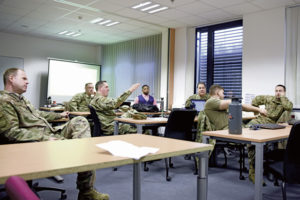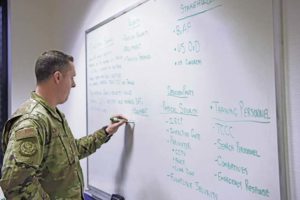
The 435th Contingency Response Support Squadron’s air advisors’ unique role allows them to engage, understand and resolve issues for U.S. allies and partner nations, which is pivotal for the strength of those partnerships and in maintaining a strategic advantage.
The air advisors, who work with partner nations in the context of aviation, recently participated in a data conference that focused on gathering and analyzing data sets for consulting missions.
The squadron invited a private sector consultant to train air advisors on new methods on data collection and analysis. They used the conference to hone their consulting skills and learn how to consolidate large volumes of information into efficient messages.
“The objective of this workshop was to learn the skills used in the private sector to understand problems and help our clients and partner nations establish outcome-based goals, which will further our relationship and the capabilities of their militaries,” said U.S. Air Force Master Sgt. James Bindert, 435th CRSS superintendent.
“These skills will be invaluable on every single mission when we provide briefings to the embassy, ministry of defense, and host nation leadership team,” Bindert said. “The data collection and delivery skills garnered streamlined our processes and guided our out-briefs to ensure everyone knows what is being asked of them.”
The 435th CRSS operates in a complex and contested-information environment. Mission success is heavily reliant on interoperability with allied and partner nations.
“The strategic advantage of utilizing more effective consulting will help us communicate more effectively to all parties, which will foster relations with partner nations and advance U.S. interests,” Bindert said.

“Our air advisors are the face of the U.S. government and have high reaching impact,” said Capt. Daniel McKeown, 435th CRSS assistant director of operations. “This workshop increased our skillset in a way that allows us to go into any partner nation and provide immediate value. This will hopefully result in the partner nation wanting to continually work with the United States.”
Due to the success of this data analysis training, the U.S. Air Force is in the process of creating its own military-specific curriculum data course.
“The importance of cultivating our skills in data collection and analysis improves the way we operate when conducting air advisor missions,” Bindert said. “When we are out on a mission, we need to make sure we are representing and advancing U.S. interests in a professional and cutting edge manner.”
The skillful application of data collection, analysis/presentation practices will lead to better data-driven decisions, ensuring the security of U.S. assets, McKeown explained.
During the three-day conference, air advisors learned the nuances between data collection, analysis, and presentation. They practiced writing problem statements, defining effective objectives for analysis, and developing tables, graphs, and charts to quickly and concisely convey information.
Although the 435th CRSS air advisors are U.S. Air Force assets, their success is based on their relationships with the host nation and U.S. Embassies in that foreign country, as well as their ability to tackle complex issues specific to that region. Due to this pivotal role the 435th CRSS focuses on strengthening partner nation relationships.
“This course provided us the knowledge to deliver the partner nations options and visual data that represents their current state and status, versus where we would like to be, ideally.” Tech Sgt. Savon Scales, 435th CRSS air advisor said.
The training further built on this key focus by teaching air advisors about their audience and how to tailor their data and messages to that audience to accomplish specific goals.
“One of the big takeaways I received from this course was understanding who the stakeholders are for the mission and making sure we gather the correct data and communicate the situation with options and recommendations that will get us to the desired future state,” said Bindert.


